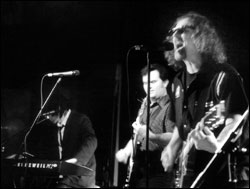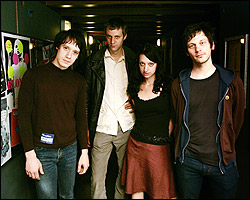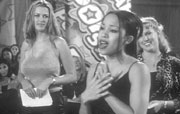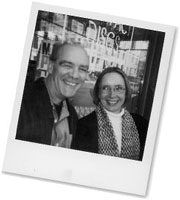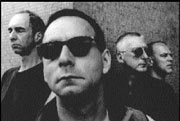Back in the early ’80s, well before Mudhoney or even Nirvana, the Young Fresh Fellows put Seattle on the map. Prior to the band’s relentless and often unrewarding tour schedule, pop music rarely made the trip up to our little town; but when college radio stations across the country latched on to the Fellows’ The Fabulous Sounds of the Pacific Northwest, and the Replacements’ Paul Westerberg championed the group’s hook-heavy melodic sound, eventually, Seattle became a destination and not just three syllables synonymous with rain. But it’s not just nostalgia that keeps Fellows frontman Scott McCaughey on the shortlist of Seattle’s most favored musicians. He continues to charm the socks off of everyone within shouting distance with his weirdly wry pop-rock send-ups. Aside from the irregular YFF “reunion,” occasional collaborations with Wilco, and a regular touring and recording gig with R.E.M., the Minus 5 are McCaughey’s main M.O., and the band’s adroitly titled In Rock (Yep Roc), their sixth release, is out this week. By turns (and often all at the same time) hard-edged, surf-inspired, harmonic, twangy, modest, and bold, In Rock seeks not to reinvent the wheel but to keep the cogs nicely greased. McCaughey, drummer Bill Rieflin, and guitarist John Ramberg—the Minus 3, if you will—sat for the Jukebox on a chilly recent Tuesday night in McCaughey’s backyard studio.
Hubble Bubble: “New Promotion” (1977) MP3
Bill Rieflin: It’s not [from] The Bridge on the River Kwai, is it?
Scott McCaughey: Bridge on the River Kwai—I wish. I’ve got the DVD.
Seattle Weekly: You probably shouldn’t know this.
McCaughey: It’s Schoolhouse Rock, right?
SW: It’s a fairly obscure Belgian band called Hubble Bubble. It’s really hard to find any of their records. I have a friend who’s incredibly gifted at finding amazing stuff on the Internet; he turned me on to them, but I’ve never actually seen an LP or anything.
Rieflin: It was probably recorded in the late ’70s or early ’80s . . .
McCaughey: For sure . . .
SW: Yep, late ’70s. You know the local band the Spits?
McCaughey: Yeah.
SW: It’s always seemed to me that they borrow heavily from these guys.
John Ramberg: I’m still trying to think who they remind me of . . .
McCaughey: I’m still thinking of the Marines, you know, when they march across the beach and the bridge.
Ramberg: Alec Guinness?
Rieflin: I actually dreamt of Alec Guinness the other night. He was singing a song very similar to this one.
Ramberg: It’s really good.
McCaughey: Did they tour with Plastic Bertrand?
SW: Actually, Plastic Bertrand, aka Roger Jouret, was the drummer for Hubble Bubble.
McCaughey: I bet Kurt Bloch must have a couple 7-inches of theirs.
Rieflin: And a book written by one of them.
SW: I think they only had one proper album, and they were on a Killed by Death comp.
Rieflin: Well, the problem with this band is that they decided to be born and raised in Belgium.
SW: Right.
The Nerves: “Hanging on the Telephone” (1976) from Nerves EP (Nerves)
McCaughey: Ah, the Nerves. They had a four-song 7-inch or something. That’s the only thing they ever released in their time.
Rieflin: So, which one of these guys started Blondie?
SW: Yeah, Blondie covered this song a few years later.
McCaughey: They probably opened for Blondie, ’cause they really didn’t have a record out and they just packed in a station wagon and started driving around the country . . .
Rieflin: Like Forever Friends?
SW: You mean Friends Forever. This, along with the Undertones, is what I imagine imprinting Scott McCaughey.
McCaughey: Oh, I’m a huge Undertones fan. [Nerves guitarist] Peter Case went on to form the Plimsouls and [Nerves drummer] Paul Collins had the Beat. I got into the Nerves when I started listening to the Beat and found out there was this band the Nerves, and I went back and found their single.
FM Knives: “Cassevettes vs. the Moneygoround” (2002) from Estrogen EP (Smart Guy)
SW: When I played their full-length for my friend Steve, he insisted they were covering a Young Fresh Fellows song.
Rieflin: They didn’t actually do a cover though?
SW: No.
Rieflin: It was on a Fellows’ tribute though, so they get all the money.
McCaughey: Yeah. All that money.
Rieflin: Well, that kind of chord progression, you know, E minor, A minor—
McCaughey: It’s not far from many songs I’ve penned, I’m sure.
SW: They get a lot of comparisons to the Buzzcocks.
McCaughey: I was gonna say, he’s almost singing with a little bit of an English accent—Pete Shelley for sure. What a great name, the FM Knives. They’re around now?
SW: Yeah, in Sacramento. I think they fight all the time and break up on a regular basis.
McCaughey: On the last Fellows tour, we had a show in Sacramento; our roadie thought we had the night off and he was like, “Where are we going?” and we said, “To that show in Sacramento.” And he was like, “What?” He was so bummed out. He was our roadie, but, well, he was our entire crew. He walked into the place and had, like, five shots of tequila, and I was like, “Just take the night off.” I don’t remember what the point was.
Les Georges Leningrad: “La Chienne” (2003) from Deux Hot Dogs Moutarde Chou (Blow the Fuse)
SW: This is a contemporary band from Montreal. I just wanted to throw it in there to see what you guys thought.
McCaughey: This is my favorite track so far, actually. It sounds to me like, if they played more guitars and it was, like, 20 years ago, they’d be like the Bush Tetras or the Delta 5 or something.
Rieflin: With a lot more morphine involved.
McCaughey: Or if the Young Marble Giants took loads of acid and used rubber bands on their guitars. If you hear the demos we do with Peter [Buck, of R.E.M. and the Minus 5], that’s like the exact drum program we use. That’s got to be, like, a super old drum machine from, like, the ’70s or something.
Rieflin: She’s swearing.
SW: La chienne, that’s dog, right?
Rieflin: Well, a female dog . . . I’m only going after what my mother always called me. She wasn’t French so I don’t think she got the pronunciation right.
McCaughey: Unless she was calling you scheisskopf.
Warhead: “Hey Big Oil” (1980) from If-Then-Else (Contagion)
SW: This is the Denny brothers from the Weirdos, a side project.
Rieflin: Oh yeah, wow. Which Weirdos—the L.A. Weirdos, the original Weirdos? I saw the Weirdos.
Ramberg: Early ’80s, right?
SW: You saw them just this last time through or . . . ?
Rieflin: No, in 1976 or ’77. It was a long time ago. I don’t know if it’s true, but in my memory there’s this famous picture where the singer’s being hauled away by the cops.
McCaughey: That was before my time.
Rieflin: Well, that was the show I was at.
McCaughey: I never saw them, but Frontier put their albums out—the same label that the Fellows were on, so I have their records, but are they back in action? Is that the deal?
SW: Yeah, they played the Sunset recently.
McCaughey: I think Kurt [Bloch] saw them.
Rieflin: Tell me they didn’t sound like this.
SW: No, no. This is just a weird side project that the two brothers had. I like it better, and figured Bill would like it for its industrial, experimental aspects. The Weirdos’ drummer told me they used a washing machine to make the drum sounds.
McCaughey: It’s a bit like the Residents.
Rieflin: Yeah, it’s Residential.
The Fore Thoughts: unknown track (mid-’60s) from a four-song 7-inch
McCaughey: I hear surf guitar.
SW: This is a Pakistani garage band from the ’60s, another awesome, obscure band my friend uncovered on MP3.
Rieflin: It’s kind of surf-ska. It’s really cool. They’re like ska music you’d hear at an Indian restaurant.
McCaughey: Obviously taken off of a 45—you can hear the hiss.
Rieflin: What’s so remarkable is that if you said that this was anything other than an obscure Indian garage band, I’d believe you, but there’s nothing remotely Indian about this music.
McCaughey: A little bit. I hear a little bit.
Rieflin: It’s totally pentatonic. It’s blues. That’s the blues.
McCaughey: Everyone’s got the blues, I guess.
Rieflin: It’s so idiomatic and—my God—it’s so right.
Death Cab for Cutie: “The New Year” (2003) from Transatlanticism (Barsuk)
McCaughey: I know this, but I don’t know who it is.
Rieflin: Is it Death Cab?
SW: Yes.
McCaughey: Oh, that’s why I know it.
Rieflin: Yeah, I saw them do this on television. I stayed up late to see it.
McCaughey: On Conan?
Rieflin: No, on the Craig Kilborn Show.
McCaughey: I didn’t even know they were on that. I would have loved to see that.
SW: Obviously, I put this on because Ben [Gibbard, of DCFC] contributed to the latest Minus 5 record.
McCaughey: Yeah, he played drums with one broken arm.
Rieflin: That’s ’cause I had two broken legs, as it were.
McCaughey: You weren’t around, and I called a bunch of people, and—of course, this was really last minute—I decided, “I gotta put drums on this tomorrow so we can put it on the record the next day.” I called Jason Finn and probably Dan Peters, I don’t know who all, and I was like, “What am I gonna do? Well, I think Ben is a pretty good drummer, maybe I’ll call him.” And he says, “Yeah, I’d love to do it, but I broke my arm yesterday.” So he shows up with a fucking cast on. We had it all recorded, I just needed drums on it, and he played ’em. It was great.
Rieflin: He used his broken arm?
McCaughey: Yeah. He had a cast on, and I guess he did the light work with that arm or whatever. I don’t think he was playing snare with it, you know, but . . .
Rieflin: I did the last five dates of Ministry’s Lolapalooza gigs with a broken hand.
McCaughey: Oh yeah, I remember that. You know, [DCFC’s] Chris Walla e-mailed me about two years ago, and I’ve been trying to e-mail him ever since, and he, like, refuses to return my e-mails.
SW: Really?
McCaughey: You know, Ben’s good with the e-mail. But that Walla, he’s a real bastard.
SW: I think he’s sort of antitechnology.
Rieflin: But he’s an engineer.
SW: I know, but like, antitechnology with life and stuff.
McCaughey: I really want to record with him at that studio [Hall of Justice] some time, though. We’ve talked about it for years; we’ve just never got around to doing it. I think their latest record is so great. I mean, all the records are great, but I think they took it to another . . .
Rieflin: Don’t say it.
McCaughey: What?
Rieflin: Don’t say the “L” word.
McCaughey: They took it to another tier.
Rieflin: Another layer.
McCaughey: They took it to another rice paddy. I think the lyrics are awesome, which is amazing considering how many he had to write last year, what with the Postal Service.
Rieflin: It’s really good, given that he’s writing in English. He doesn’t have that poetic sense of Belgian French.
McCaughey: This is just a really great song. Is this the one they played on Conan?
Rieflin: No the other guy: Craig Kil—Gilchrist. Cookie Gilchrist.
McCaughey: The Craig Gilchrist show.
Rieflin: Wasn’t Cookie Gilchrist a running back for the Buffalo Bills in the AFL, early ’60s?
Robert Wyatt: “At Last I Am Free” (1980) from Nothing Can Stop Us (Rough Trade)
Rieflin: Oh, this is great. The story of this song is that Wyatt was sitting around a bar, probably drunk . . .
McCaughey: Was he in a wheelchair at that point?
Rieflin: Don’t laugh at drummer Robert Wyatt, Scott.
McCaughey: I love Robert Wyatt. And we’re gonna cover one of his songs.
Rieflin: The original [by Chic] was playing on the radio as Wyatt was sitting in the bar, and he just broke into tears, as the story goes anyway. And it was a surprise, because Chic isn’t really a band you’d think would make a person fall into tearful reverie, but his version of the song is way butt-kickin’ over Chic’s.
McCaughey: It’s weird, because he’s written a lot of really good songs, but it seems like he’s known for his interpretations of other people, like “Shipbuilding” and stuff like that.
Rieflin: Well, that was written for him.
McCaughey: Yeah, his was the original version. Elvis Costello wrote it for him, it was an antiwar song, when the British were in the Falklands. He wrote it really quickly, I think when they were still there. Not that that was a long war, or anything.
Rieflin: The large rock in the middle of the ocean didn’t defend itself particularly well. I didn’t write many fan letters as an enthusiastic young teenager, but I wrote one to Robert Wyatt, care of Virgin Records. And in return I received—well, it was a form letter—but also a press photo of Robert Wyatt and his wife, Alfreda, and he’s sitting in his chair and she’s standing behind him with a knife.
McCaughey: Have you met him?
Rieflin: No.
McCaughey: I thought maybe you would have.
Rieflin: I’ve met or worked with almost everyone I’ve wanted to, but I’ve never worked with Robert Wyatt.
The Raincoats: “In Love” (1980) from The Raincoats (DCG)
SW: You’ll know this. Just give it a minute. My boyfriend actually made me stop listening to this song because it makes me cry.
McCaughey: Feel free to break into tears.
SW: I’m over it; it’s cool.
McCaughey: I know this . . .
SW: They’re an all-female band from London in the late ’70s . . . resurrected in the mid-’90s due to a rather influential Seattleite . . .
McCaughey: The Raincoats.
Rieflin: Robert Wyatt worked with the Raincoats. I think he did a song with them.
McCaughey: Cobain was a huge fan.
SW: Yeah, it’s because of him that DCG reissued their stuff. And then later on, like in ’96, Steve Shelley produced a record for them.
McCaughey: You know, I said Raincoats but I was thinking about the Dishrags.
Rieflin: Yeah, the Dishrags. Vancouver bands. I think the Dishrags became a band because of the Raincoats.
McCaughey: You think so?
Rieflin: I think so.
Angels of Light: “Evagaline” (2001) from How I Loved You (Young God)
Rieflin: I thought at first that this was something off the first Minus 5 record. I mean, I know it isn’t . . .
McCaughey: Are you sure?
Rieflin: I know: It’s off the second Minus record. Well, my copy has this on it.
McCaughey: You have the Japanese version?
Rieflin: No. Actually the Croatian. There were two extra tracks. Who is this?
SW: Angels of Light.
Rieflin: Oh, of course. Which record is this on?
SW: Not one that you’re on.
Rieflin: It’s the one I’m not on. That’s why I don’t know it. I never listen to records I don’t play on. Ah . . . Michael Gira. The Swans. Yeah, this is cool.
SW: You seem to play on just about every other record of his.
Rieflin: Yeah, Michael’s asked me to play on the new Angels record. It’s interesting because I only set out to do a few things in my life, and one of them was to play with the Swans. I heard the first Swans record and I thought it was one of the greatest things I’ve ever heard. And I ran into the bass player at a bar in Chicago and said, “Hey, if there’s ever an opportunity, I want to play.” And word got back to Michael, and he called me on April Fools’ Day. We had a great conversation, and later that year we made a record together.
McCaughey: I remember when you were talking to [Wilco’s Jeff] Tweedy and you were like, “The Swans are the best band ever; the best show ever,” and all this stuff.
Rieflin: Yeah, Tweedy and I really bonded on the Swans. Michael and Jarboe [also of Swans] came and stayed at my house when I was moving out, and we recorded Drainland. It was a solo record of his; he and Jarboe and I made that record in an empty house that I was moving out of.
SW: Here in Seattle?
Rieflin: Yeah. There were two weeks of terrible weather, there was a week of flooding—it was horrible. And then I went to work on the first Angels of Light record in Atlanta, and I was incredibly ill. Every time I work with Michael, the situation’s uncomfortable. And that creates great music.
McCaughey: Or great pain?
Rieflin: It creates great discomfort.
